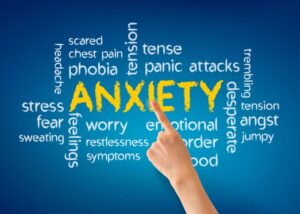
In a world that moves quickly, anxiety often feels like an unwelcome guest that lingers too long. Rather than battling the feelings of an anxious brain, what if the key to lessening the impact was simply to acknowledge and coexist with these thoughts? The anxiety treatment specialists at Wake Counseling offer a compassionate approach to managing anxiety symptoms, focusing on recognizing their presence without immediate reaction.
By practicing mindfulness, engaging in meaningful activities, and fostering self-compassion, you can learn how to retrain your brain from anxiety. Join us as we explore strategies to rewire your brain in order to live a more calm and calming life.
Understanding Anxiety
Anxiety is a natural human response designed to alert us to potential dangers, helping us prepare for and respond to threats. However, when anxiety becomes a constant presence, it can disrupt daily life and become overwhelming. It’s essential to understand not only what anxiety feels like but also how it manifests so we can better address it.
Symptoms of Anxiety
Anxiety can manifest through a variety of physical and emotional symptoms:
Physical Symptoms: Increased heart rate, rapid breathing, restlessness, or trouble sleeping.
Emotional Symptoms: Feelings of dread, irritability, heightened vigilance, or constant worry.
Understanding these symptoms is the first step towards learning how to train your brain to stop worrying when you are experiencing anxiety.
Anxiety Disorders and the Brain’s Fear Center
Chronic anxiety and other anxiety disorders are closely linked to the brain’s fear center, or the amygdala, which plays a pivotal role in how the human brain processes emotions like fear and anxiety. When faced with what it perceives as a threat, the amygdala activates the fear response, releasing stress hormones that prepare the body to either fight or flee. In those with anxiety disorders, this system can misfire, causing the fear response to activate without any actual danger. This leads to an overwhelming flood of emotions, increased blood pressure, negative thoughts, and heightened alertness.
The Cycle of Anxiety and Its Effects
The constant triggering of these responses can reinforce negative thinking patterns and emotional stress, focusing on potential future threats versus probable positive outcomes.
Over time, everyday anxiety provoking situations strain the body while perpetuating a cycle of anxiety where you:
experience a panic attack
have fearful thoughts
have your fear response overwhelm any feelings of calm
resist steps to heal anxiety
Addressing this hyperactivity and fear pattern through targeted therapies helps:
teach the brain to stop worrying
respond more appropriately to stimuli
reduce the frequency and intensity of your anxiety or panic disorder
The Misconception of “Fighting” Anxiety
The common advice to “fight” anxiety is well-intentioned but often misguided. When we attempt to combat anxiety aggressively, we may inadvertently reinforce its presence. Anxiety thrives on the struggle—it grows stronger when we view it as an enemy to be defeated. Instead, recognizing anxiety as a natural part of life can be the first step in reducing its power over us.
Why It’s Counterproductive to Fight
Trying to fight anxiety can lead to a cycle of increased anxiety and avoidance behaviors. This cycle can reinforce the belief that anxiety must be avoided at all costs, which only increases its impact. The goal is not to eliminate anxiety entirely but to learn to manage it effectively. By acknowledging that anxiety is a part of life, you can shift your focus from eliminating anxiety to learning how to train your mind to be stronger during anxious moments.
When we stop viewing anxiety as a dire threat, we begin to lessen its emotional weight and reduce the urgency it seems to demand. This shift is crucial in transforming how we experience and respond to anxiety, paving the way for more profound, long-lasting peace and resilience.
The Science of Retraining Your Brain
The brain’s ability to adapt and change in response to new experiences is known as neuroplasticity. This fundamental characteristic of our nervous system underpins our capacity to retrain the brain, even in the face of persistent anxiety.
How Neuroplasticity Works
Neuroplasticity refers to the brain’s ability to reorganize itself, both physically and functionally, throughout our lives based on our behaviors, environment, and neural processes. It is the mechanism through which all learning occurs, including the unlearning of anxiety-driven patterns of thought and behavior.
When we consistently engage in new behaviors or thought patterns, we can forge new neural pathways. Each time we choose a response to anxiety that doesn’t involve panic or avoidance—for instance, observing our feelings with detachment or engaging in a calming activity—we strengthen these new pathways. Over time, these pathways can become the default response to anxiety triggers, weakening old patterns characterized by fear and urgent reactions.
Here are some of the ways to train your brain to stop worrying when anxiety strikes:
Mindful Awareness: Practicing mindfulness through focused breathing, meditation, and nonjudgmental observation helps you become aware of anxiety without reacting to it.
Consistent Practice: Regular mindfulness and relaxation activities are crucial for reinforcing healthier neural connections and retraining your brain.
Positive Reinforcement: Celebrating small victories over anxiety strengthens behavior changes and solidifies new neural pathways.
Steps for Managing Anxiety
If you suffer from an anxiety disorder, it’s helpful to learn how to manage your anxiety with effective strategies that help you regain control and achieve daily calm. Let’s look at some practical techniques to navigate anxious feelings and retrain your brain to avoid having anxiety overwhelm your daily life and activities.
Step 1: Awareness and Acknowledgment
Managing anxiety begins with becoming acutely aware of its presence without judgment or fear. Acknowledge your anxiety as a natural part of your experience. By naming your anxiety, you reduce its power without immediately trying to change or fix it. This acceptance is crucial as it lays the foundation for deeper behavioral changes and coping strategies.
Step 2: Engaging in Valued Activities
After recognizing and accepting your anxiety, focus on engaging in activities that bring you joy and fulfillment. Whether it’s a hobby, spending time outdoors, exercising, or being with loved ones, these meaningful activities provide positive distractions and enhance your well-being. Integrating these into your daily life shifts your focus from anxiety to a more balanced existence, helping weaken old anxious thought patterns.
Step 3: Learning to Ignore the ‘Urgency’
Anxiety often creates a false sense of urgency. Learn to recognize and dismiss this sensation. Techniques like deep breathing, progressive muscle relaxation, or guided visualizations teach your body and mind that anxious feelings don’t necessitate immediate action. Over time, consistently ignoring this false urgency teaches your brain to manage these signals calmly, reducing their frequency and intensity.
Step 4: Developing Compassion Towards Yourself
The last step involves cultivating compassion towards yourself, countering the self-criticism that anxiety often brings. Remember, experiencing anxiety is not a personal failure. Treat yourself with kindness, engage in self-care, and use positive affirmations to build self-worth and resilience. This self-compassion soothes current anxiety and fosters a supportive relationship with yourself for the future.
Options for Treating Anxiety for Improved Mental Health
Managing anxiety effectively often requires a multifaceted approach. Depending on its severity and impact, various anxiety treatments can be tailored to meet your specific needs, ensuring you regain your quality of life and mental health.
Therapy
Cognitive Behavioral Therapy (CBT) is one of the most effective forms of therapy for anxiety. It focuses on identifying and changing negative thought patterns and behaviors that contribute to anxiety. Other therapeutic approaches, such as exposure therapy or acceptance and commitment therapy (ACT), can also be beneficial, depending on the nature of your anxiety.
At Wake Counseling, our experienced therapists offer counseling sessions for individuals struggling with anxiety, depression, and other mental health struggles. We provide a supportive and confidential environment where you can explore your feelings and develop strategies to manage your mental health effectively. Our team is dedicated to helping you achieve personal growth and improved well-being through personalized therapy tailored to your unique needs and circumstances.
Medication
Medication can be an essential part of an anxiety treatment plan, especially for those with severe anxiety. Antidepressants, anti-anxiety medications, and beta-blockers are commonly prescribed to help manage symptoms. It’s important to discuss all medication options with your healthcare provider to understand potential side effects and find the medication that works best for you.
Lifestyle Changes and Alternative Approaches
In addition to therapy and medication, lifestyle changes can significantly impact anxiety levels. Regular physical activity, a healthy diet, sufficient sleep, and mindfulness practices like meditation can all help reduce anxiety. Alternative treatments such as acupuncture or herbal supplements may also provide relief, though they should be pursued with professional guidance to ensure they are suitable for your situation.
Start Your Path to Better Mental Health with Our Anxiety Therapists in Raleigh
If you’re struggling with anxiety and looking for support, Wake Counseling is here to help. Our team of compassionate professionals offers a range of mental health services tailored to meet your individual needs. We are committed to guiding you towards a calmer, more fulfilling life with strategies to overcome your anxiety.
Contact us today by calling 919-647-4600 or filling out the online form below to schedule a consultation and start your journey to better mental health.
Recent Blog Posts

How to Retrain Your Brain from Anxiety
Learn how to retrain your brain from anxiety with this 4-step guide that explains how the brain and anxiety are connected so you can find lasting relief.

Healing Virtually: Your Online Therapy Guide
In an increasingly digitized world, even the most intimate aspects of our lives have found their way onto screens. Therapy, once confined to the therapist’s couch, has now transcended physical boundaries, offering healing and support through the virtual realm. As the world evolves, so does our approach to mental health

Mindful Healing: Anxiety Treatment Tips
Anxiety can be a relentless companion, casting a shadow over every aspect of life. However, there is hope. Mindful healing offers a pathway to relief, empowering individuals to navigate their anxiety with grace and resilience. In this article, we’ll explore some effective anxiety treatment tips rooted in mindfulness practices. Cultivate

Finding Calm: Navigating The Path To Anxiety Treatment
Living with anxiety can feel like being caught in a perpetual storm, with thoughts swirling uncontrollably and a constant sense of unease. However, finding relief from anxiety is possible with the right treatment and support. In this article, we’ll explore the journey to anxiety treatment, offering guidance on navigating the

Navigate Stress: Empowering Strategies From Online Therapy
In today’s fast-paced world, stress has become an unavoidable aspect of daily life. From work deadlines and financial pressures to personal responsibilities and societal expectations, navigating the complexities of modern existence can often feel overwhelming. However, amidst the chaos, there is hope. Online therapy offers a wealth of empowering tactics

Unlocking Mental Wellness: Embrace Online Therapy Today
In today’s fast-paced world, prioritizing mental health has become more crucial than ever. As we navigate through the challenges of daily life, it’s essential to recognize the importance of maintaining a healthy mindset. Fortunately, with the advancement of technology, accessing professional support for mental well-being has never been easier. Online


